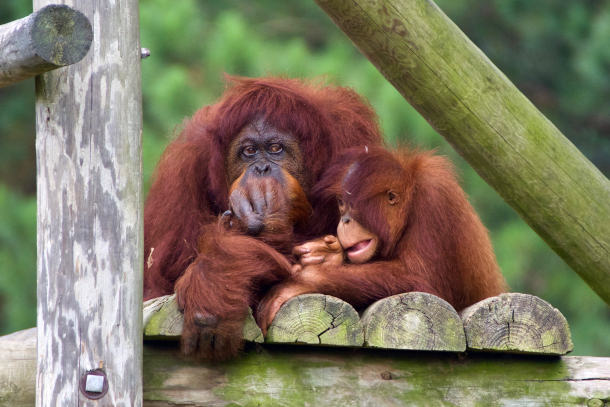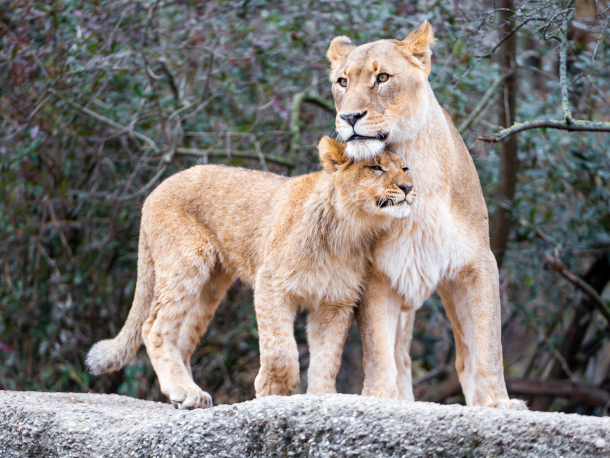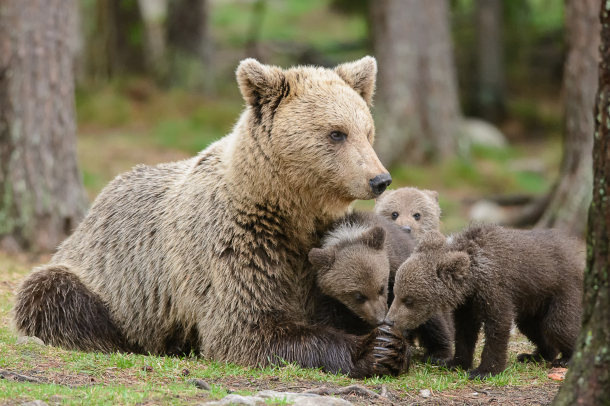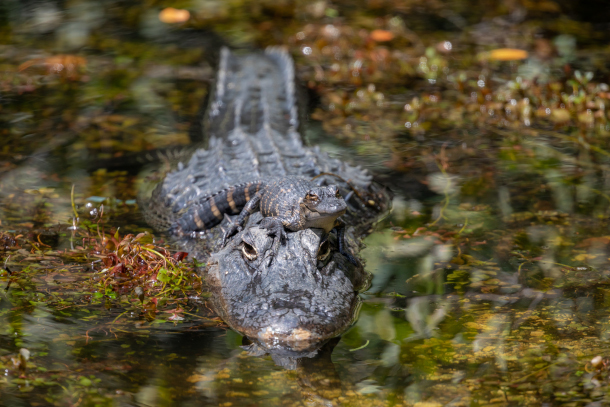Amazing Animal Mothers
Air Date: Week of May 12, 2023

During the first two years of life, baby orangutans rely on their mothers for food, transportation, and protection. (Photo: Ucumari Photography, Flickr, CC BY-NC-ND 2.0)
This Mother’s Day we’re celebrating the tenacity and tenderness of animal mothers, from crocodiles to leopards to whales. Aletris Neils is the executive director of Conservation CATalyst and joined Living on Earth’s Bobby Bascomb to share why observing mother orangutans inspired her own journey to becoming a mother.
Transcript
CURWOOD: From PRX and the Jennifer and Ted Stanley Studios at the University of Massachusetts Boston this is Living on Earth. I’m Steve Curwood.
Mother’s Day is upon us and so I’d like to wish a happy Mother’s Day to all including Living on Earth’s Bobby Bascomb, the mother of two growing girls. Happy Mother’s Day, Bobby!
BASCOMB: Thanks, Steve. Of course, you must also remember the mothers living in your personal life, your wife and daughter.
CURWOOD: Oh yes, Sunday brunch is a tradition in our family.
BASCOMB: Sure, that’s the classic, of course you can’t go wrong with flowers as well.
CURWOOD: Sure, and I can even pick em now
BASCOMB: Oh I love that. But you know I’ve been thinking a bit about animal mothers and strategies they’ve evolved for dealing with the challenges of motherhood without the benefit of medicine and schools, things human mothers rely on. So, I called up Aletris Neils, she’s the executive director of conservation catalyst and author of an upcoming book devoted to mammal mothers. Welcome to Living On Earth.
NEILS: Thank you so much for having me.
BASCOMB: Well, what is it about animal mothers that drives them to protect their children so fiercely. I mean, the classic thing you know, probably everyone has heard of is that you don't want to mess with a mama bear, for instance.
NEILS: So typically animals that have really long gestation, longer periods of maternal care, those are the animals that are the fiercest mothers. So they will do kind of everything in their power, including put their own lives at risk to protect their young animals, like bears that you might invest years in their cubs are an excellent example of that. Even animals that we don't think of as being very maternal animals, like crocodiles are actually fantastic mothers. And so when I worked on crocodiles these moms would ferociously guard their nest, ferociously. You don't want to mess with a mama crocodile.
BASCOMB: [LAUGH]
NEILS: Like, you know, most crocodiles when they see people will just absolutely go the other direction. A mother crocodile is the exception, like she will charge you, she will come right after you, particularly if you're near her nest and so she'll defend that nest. And then when those babies start hatching, they start making these really sweet little chirping noise. And she'll go and actually help undig the nest and very, very gently open those eggs sometimes if the baby's stuck, and then put them in her mouth and carry them down to the water, because that's a period where there's a lot of potential predation, you know, where those babies are very vulnerable. And she'll stay and guard those babies. And in cases now, it's been documented where she'll actually make kills, and hold the meat in her mouth and let the babies feed off of it. So I think the more we learn, the more we start to understand that so many animals are just incredible mothers.

A mother jaguar must teach their offspring skills such as hunting, stashing food, swimming, and fighting off predators. It’s a demanding process, so a mother jaguar mates every 2 years to give her the energy to raise and teach her cubs. (Photo:Tambako the Jaguar, Flickr, CC BY-ND 2.0)
BASCOMB: Now, you've spent a lot of your career studying big cats largely in Namibia, what have you observed between mothers and their cubs there?
NEILS: Yeah, so big cats are just such spectacular moms, not only because I mean, their lives are just so difficult. I mean, if you imagine, you know, big cat is really always operating on the margins. And so there are, you know, no grocery stores and there are no food reserves, if a cat doesn't make a kill, it doesn't eat, and if it doesn't eat doesn't live. And so you can just imagine these big cats that are out on this landscape, and they're pregnant and very pregnant but still, at the same time, they have to, with this giant, cumbersome, engorged uterus, still go out there and take down, you know, an impala or any of these animals that are quite formidable and really difficult. And if they don't do that, they don't survive. And then immediately after she gives birth, she has to feed those young and that's very energetically expensive. And so then it's same time right after she's gone through and given birth, and she has to go back out and make a kill again and continue doing that, if she's going to successfully raise those cubs. And something that I find so fascinating, you know, when mammal instincts or an animal instincts conflict with one another and so, in some cases, that motherhood instinct, just so completely overrides the survival instinct, or that motherhood instinct is so strong that animals will actually adopt other species. And so there's these, you know, rare examples of a leopard mother that will adopt a baby baboon, and so it's picking up on those, probably the cues of this baby crying, and any mother can relate to this, when you hear a baby crying anywhere, you're just hardwired to respond to that, possibly pheromones that that baby has as well. And you know this mother leopard, I mean leopards eat baboons, you know, they're considered to be enemies in a lot of situations, but yet we'll carry around and care for a baby baboon. And you know, in cases of lions, doing the same thing with antelope, where, you know, they will find baby antelope and instead of eating them will take care of them and actually protect them from other lions. And so, you know, I think that motherhood instinct that motherhood drive is so strong, that it can absolutely override everything else. It's just really amazing.

Mother bears are considered one of the most protective mammals when it comes to the safety of her cubs. (Photo: Arend, Wikimedia Commons, CC BY 2.0)
BASCOMB: I mean, that is amazing. You think of a young antelope is easy pickings for a lion. That's, you know, the first thing that would go for the young, the old, the infirmed. It's amazing to think that the drive to motherhood can override you know, the instinct to hunt and to feed yourself.
NEILS: Yeah, precisely. And one of these examples it was a mother lion who lost her cubs and you know, was probably mourning for those cubs and then picks up the pheromones from this, you know, baby willdebeest, and then that just overrides everything. And she just protects this wildebeest, even from, from other lions that want to eat it. And, you know, we think about these gray whales, I mean, these are mothers that their food is up in the Arctic, it's up in Alaska, yet they need a safe warm place to have their babies to have those calves. And so they migrate thousands and thousands of miles over months. And the entire time, you know, with this giant calf in their uterus, to get to these warm safe bays in Baja, and the entire time they're fasting. So not only is she a growing this baby, but then she has to give birth to this baby and then she has to lactate and feed this baby, and the entire time she's not eating herself. And then at that point where she's just absolutely energetically spent that now she has to migrate back thousands of miles slowly with this baby, to get to a place where she can feed. I just think that's so miraculous. I mean these are just, you know, mothers that are so amazing and I'm just inspired by them every day.

Although not commonly perceived as such, alligator mothers are very caring towards their young. After spending 9-10 weeks protecting her eggs, she stays with the hatchlings for at least the first year of their lives. (Photo: Matthew Paulson, Flickr, CC BY-NC-ND 2.0)
BASCOMB: Now, you've been a wildlife biologist and a conservationist for more than a decade. Are there any sort of magical motherhood moments that you've experienced in that time?
NEILS: Yeah, I have a very special moment where we are down in Baja. And we actually witnessed a gray whale that gave birth and then very gently lifted that calf and you know, this is a massive calf, it's close to 15 feet long, lifts it up to the surface to take its first breath. And when they're born, they're very floppy and the cartilage in their tail hasn't hardened yet. And so you know, they're very clumsy, they're not able to swim it takes a little bit of time and that mom is just so gentle, so compassionate, and just will kind of gently hold that baby to the surface, you know, encourage it to kind of try to swim around a little bit and then keep lifting it up so that it can keep taking those breaths. And it's just absolutely magical. And one of the the moments that actually inspired me to become mom was watching orangutans. So watching orangutans in Sumatra, and in Borneo, and just these mothers were just so loving and their whole world was that baby. And you know, everything that they did was was this baby and the moms would meet in the afternoons and they would all break down branches and make these like little platform nests, and bring their babies and the babies would play together and the moms would kind of rest and they would take turns looking after the babies so that the moms can each kind of get a nap. And it's just so lovely and so beautiful. And that was the moment I decided that you know, I wanted to become a mom, you know it was was watching that and feeling like I wanted to experience that.
BASCOMB: Absolutely. Aletris Neils is the executive director of Conservation Catalyst. Aletris thank you so much for your time today and Happy Mother's Day.
NEILS: Thank you so much for having me. I've really enjoyed it.
Links
Watch a Grey whale giving birth
Learn more about Aletris Neils
National Geographic | “Why Animals "Adopt" Others, Including Different Species”
Living on Earth wants to hear from you!
Living on Earth
62 Calef Highway, Suite 212
Lee, NH 03861
Telephone: 617-287-4121
E-mail: comments@loe.org
Newsletter [Click here]
Donate to Living on Earth!
Living on Earth is an independent media program and relies entirely on contributions from listeners and institutions supporting public service. Please donate now to preserve an independent environmental voice.
NewsletterLiving on Earth offers a weekly delivery of the show's rundown to your mailbox. Sign up for our newsletter today!
 Sailors For The Sea: Be the change you want to sea.
Sailors For The Sea: Be the change you want to sea.
 The Grantham Foundation for the Protection of the Environment: Committed to protecting and improving the health of the global environment.
The Grantham Foundation for the Protection of the Environment: Committed to protecting and improving the health of the global environment.
 Contribute to Living on Earth and receive, as our gift to you, an archival print of one of Mark Seth Lender's extraordinary wildlife photographs. Follow the link to see Mark's current collection of photographs.
Contribute to Living on Earth and receive, as our gift to you, an archival print of one of Mark Seth Lender's extraordinary wildlife photographs. Follow the link to see Mark's current collection of photographs.
 Buy a signed copy of Mark Seth Lender's book Smeagull the Seagull & support Living on Earth
Buy a signed copy of Mark Seth Lender's book Smeagull the Seagull & support Living on Earth

